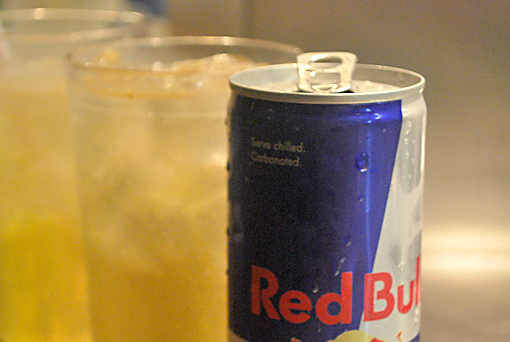Energy drink company Red Bull hires five more lobbyists to defend its interests in Ottawa, while student organizations and city officials call for ban of the beverage in bars.

After publicity stunts featuring athletes skydiving from space, motorcycling on mountains and swimming with jellyfish, Red Bull tries out a new high stakes challenge: lobbying on Parliament Hill.
The energy drink giant just hired five more lobbyists in Ottawa, according to information obtained through the Office of the Commissioner of Lobbying of Canada. The consultants all registered between May and August 2014 and list Red Bull Canada Ltd. as one of their main accounts.
Their goal? Meet representatives of Health Canada and the House of Commons as soon as possible to “ensure that energy drinks transition from the natural health products regulations to the foods regulations.”
One consultant also wants to talk about “labeling requirement and additives levels.”
The five new consultants have listed national lobbying firms Global Public Affairs and Prospectus Associates in their profiles. Prospectus Associates confirmed Red Bull is a client since 2011. Global Public Affairs did not respond to our calls.
In total, six part-time consultants and one in-house lobbyist are now speaking to government entities on behalf of Red Bull Canada Ltd. According to our analysis, it is more than the number of federal lobbyists hired by Coca-Cola Refreshments Canada, Molson Canada and Nestle Waters Canada. No other energy drink company has registered lobbyists in Ottawa.
Lobbying is a legal and regulated activity in Canada, where companies can hire as many consultants as they wish to defend their interests in meetings with government officials and elected members. They typically discuss new laws, federal grants and government contracts.
Old tactics and new surveillance
To fully understand this new move, one has to look at the federal legislations in the works, explains Dan Shaw, of the Rowe School of Business at Dalhousie University.
“They are spending more in lobbying because they are perceiving some kind of threat in their environment,” says Shaw. “It could be a regulatory threat or the impact of public bashing. It could also be an opportunity to go to the offense.”
This move comes nearly two years after Health Canada announced it was going to stop considering energy drinks as a “natural health product” but rather as “food”. A change that also comes with new limitations: from now on, energy drinks cannot contain more than 180 mg of caffeine, about the same as a regular cup of coffee. Caps are also imposed on the amount of vitamins, minerals and amino acids per can.
Energy drink companies are also under more government scrutiny. Until 2017, energy drink companies have only temporary authorization to sell their beverages, during which they’ll be required to report annual data on sales, consumption and incidents.
A Growing Market Share
The new consultants are likely to cross paths with Jim Goetz, the president of the Canadian Beverage Association, which counts energy drink companies Red Bull and RockStaramong its 60 members.
In a letter addressed to the Toronto Board of Health, Goetz warned city councillors that banning energy drinks from bars could cost the city jobs and money.
“This possible ban,” Goetz writes “could impact companies who not only have their head office in the City of Toronto, but also hold events that attract tourists and investments, and also employ thousands of people in the GTA.”
He adds “energy drinks sales is a growing market in Canada because it is new”, but couldn’t provide numbers at the time of our interview. According to Red Bull’s official website, in 2012, more than 5 billion cans of Red Bull where drank worldwide.
Opposition across Canada
At the same time Red Bull is boosting its lobbying campaign, groups against the sale of energy drinks are gaining traction. In Toronto, city councillors will soon vote to possibly change the Municipal Alcohol Policy and ban energy drinks from all bars. In a report presented July 30th, 2014 staff writes: “When consuming energy drinks mixed with alcohol, persons may have a false sense of alertness as the drowsiness and symptoms of alcohol intoxication may be masked by the caffeine. As a result, there is a risk they may over-consume alcohol and injure themselves or others.”
“It is simple: if you mix alcohol and energy drinks, you are more likely to commit sexual assault, or be sexually assaulted, you are more likely to injure yourself or somebody else, you are more likely to end up in hospital,” says Jonathan Williams, the executive director of Student NS.
In a study published last winter, Student NS looked at the way students mix energy drinks with alcohol on campus, as well as the economics of energy drinks in bars. “We have heard different things,” explains Williams. “We heard it was a major money maker and we heard it wasn’t a significant product in the bar, it depended on the campus. We have made our recommendations. Right now the ball is in the court of student unions, they have to decide if they will sell them or not.”
We are sitting at the Grad Bar, in the Dalhousie University campus, a few days before the official start of the semester and the infamous Frosh Week. “I think the evidence is there and that is an issue that is not going to go away,” says Williams. “I think red bull is hiring more lobbyists because they see this is a fight that won’t go away.”
A few meters from our table, the small Red Bull fridge is happily humming on the bar counter, awaiting the next customer. One more reminder that this fight, like he says, will not go away.
-30-
